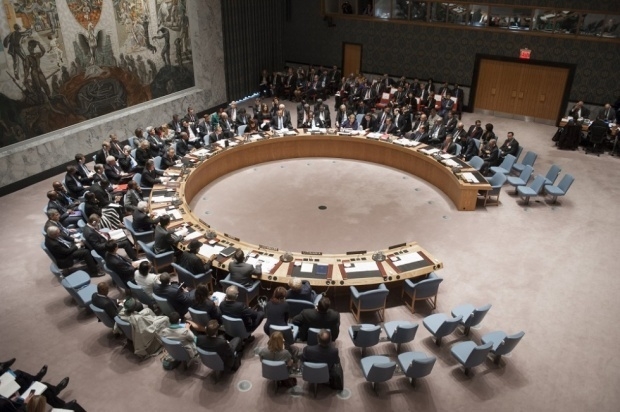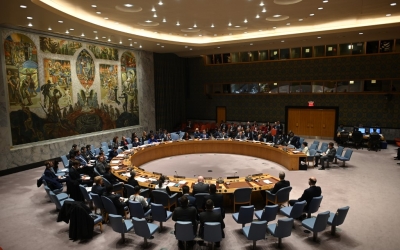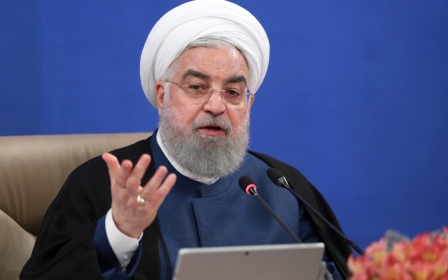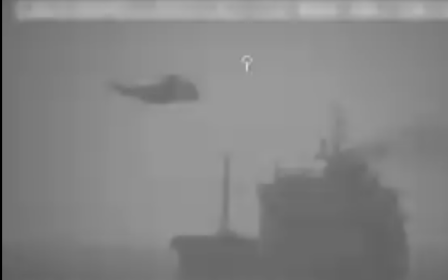UN Security Council rejects US bid to extend arms embargo on Iran

The United Nations Security Council late on Friday rejected a resolution from the US to extend an arms embargo on Iran set to expire in October.
The resolution, a heavily edited second draft that had been cut down to four paragraphs, failed to secure the nine votes necessary for passage, with 11 members, including France, Germany and Britain, having abstained, while the US and the Dominican Republic were the only two members to vote in favour.
New MEE newsletter: Jerusalem Dispatch
Sign up to get the latest insights and analysis on Israel-Palestine, alongside Turkey Unpacked and other MEE newsletters
US Secretary of State Mike Pompeo said the Security Council rejected "a reasonable resolution" that would extend the arms embargo and prohibit the Islamic Republic from buying and selling conventional weapons.
"The Security Council's failure to act decisively in defense of international peace and security is inexcusable," Pompeo said in a written statement.
The US was not expected to receive enough votes since it announced the draft resolution, removing the need for Russia and China - who opposed the measure - to wield their vetoes, which they had indicated they were prepared to do.
Washington has become increasingly isolated regarding Iran issues at the Security Council since President Donald Trump pulled the US out out of the internationally backed Iranian nuclear deal in 2018.
The UN imposed a ban on the export of most major conventional weapons to Iran in 2010. But after the Iran nuclear deal, known formally as the Joint Comprehensive Plan of Action (JCPOA), went into effect in October 2015, a potential five-year expiration date for some aspects of the embargo was set for this October.
Washington has previously warned that a failure to extend the embargo would cause the US to trigger a snapback of UN sanctions.
Diplomats have said the US could do this as early as next week, but would face a tough, messy battle in the process.
Such a move, if successful, would require Iran to suspend all nuclear enrichment-related and reprocessing activities, including research and development, and ban imports of anything that could contribute to those activities, or to the development of nuclear weapon delivery systems.
States would also be urged to inspect shipments to and from Iran and authorise them to seize any banned cargo.
Russia proposes video summit on Iran
Last month, Brian Hook, the departing US envoy to Iran, also made it clear that the US would be willing to use military force as a means to stop Tehran from obtaining nuclear capabilities if it were to make such an attempt.
Iran, for its part, denies that it is working on producing a nuclear weapon.
Europe has acknowledged the nuclear deal is not working as planned, primarily because of Washington's "maximum pressure" sanctions campaign, but has expressed more interest in mediation than in the reinstatement of international sanctions.
Russian President Vladimir Putin on Friday proposed a video summit with the US and the remaining parties to the nuclear deal - Britain, France, China, Germany and Iran - to try to avoid further "confrontation and escalation" at the UN.
"The issue is urgent," Putin said in a statement, and said the alternative was "only further escalation of tensions, increasing risk of conflict - such a scenario must be avoided".
French President Emmanuel Macron is open to taking part in a video summit, according to an Elysee Palace statement.
Trump told reporters that he heard about such a summit but had not yet been directly spoken to about it.
Middle East Eye delivers independent and unrivalled coverage and analysis of the Middle East, North Africa and beyond. To learn more about republishing this content and the associated fees, please fill out this form. More about MEE can be found here.





